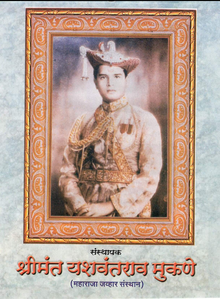
Back ماهاراجا Arabic Махараджа Byelorussian Махараджа Bulgarian Maharajà Catalan ماھاراجا CKB Mahárádža Czech Maharaja Danish Maharadscha German Μαχαραγιάς Greek Maharaĝo Esperanto
This article needs additional citations for verification. (November 2017) |

Maharaja (/ˌmɑː(h)əˈrɑːdʒə/[1] MAH-(h)ə-RAH-jə; also spelled Maharajah or Maharaj) is a Sanskrit title for a "great ruler", "great king", or "high king".[2]
A few ruled states informally called empires, including the ruler Raja Sri Gupta, founder of the ancient Indian Gupta Empire, and Chandragupta Maurya.[3] 'Title inflation' soon led to most being rather mediocre or even petty in real power, which led to compound titles (among other efforts) being used in an attempt to distinguish some among their ranks.

The female equivalent, Maharani, Maharanee, Mahārājñī or Maharajin, literally 'Great Queen', denotes either the wife of a Maharaja (or Maharana, Maharao, Maharawal) or also, in states where it was customary, a woman ruling without a husband. The widow of a Maharaja is known as a Rajamata, "queen mother".[4] Maharajakumar generally denotes a son of a Maharaja, but more specific titulatures are often used at each court, including Yuvaraja for the heir (the crown prince). The form "Maharaj" (without "-a") indicates a separation of noble and religious offices, although since in Hindi the suffix -a is silent, the two titles are near homophones.
- ^ "Maharaja". Oxford English Dictionary (Online ed.). Oxford University Press. (Subscription or participating institution membership required.)
- ^ Tej Ram Sharma (1989). A. Concept Publishing Company. ISBN 81-7022-251-6.
... Literally Maharaja means 'a great king' ...
- ^ "Maharaja | Hindu title". Encyclopedia Britannica. Retrieved 17 April 2021.
- ^ Hansdev Patel (1998). Royal Families and Palaces of Gujarat. Scorpion Cavendish. ISBN 1-900269-20-1.
© MMXXIII Rich X Search. We shall prevail. All rights reserved. Rich X Search